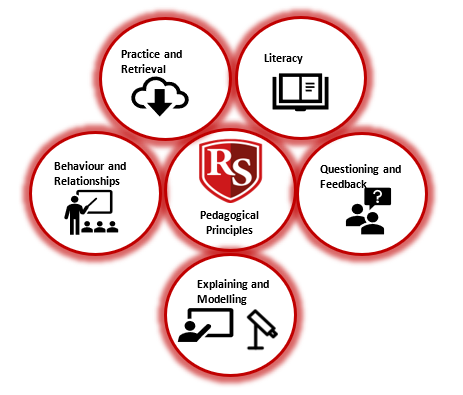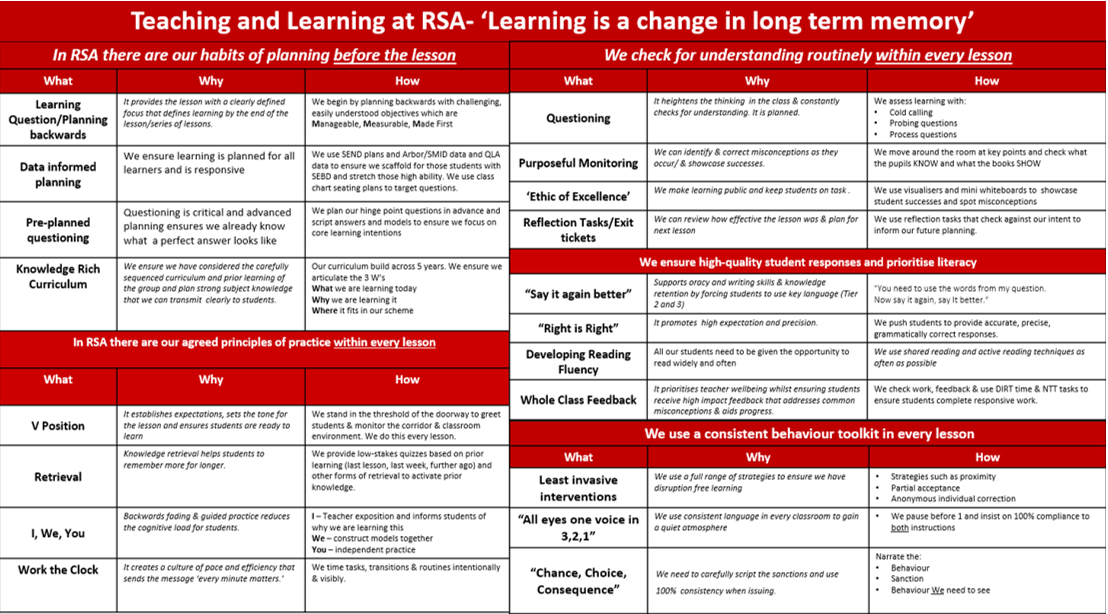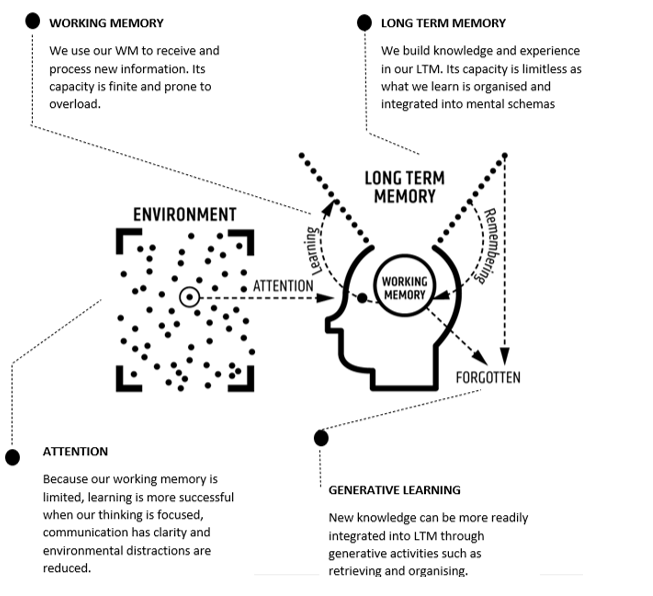
Teaching and Learning at Rudheath
Teaching and Learning at Rudheath is based on ‘evidence-informed wisdom’ that has been chosen to suit the needs of our context. We have a core set of “Pedagogical Principles” which we consider to be the foundation of great teaching. These core principles are largely based on Tom Sherrington’s four strands of Rosenshine (sequencing concepts and modelling, questioning, reviewing material and stages of practice). However, as we have evolved as a school, we have also incorporated the principles of Literacy and Behaviour and Relationships to best support the needs of our students. As a school, we are relentless in striving to be 1% better every day- this includes our staff professional development. With that in mind, our CPD Curriculum Pathway has been designed to ensure that professional development is meaningful and has a clear direction.

The Rudheath Standard
To ensure we have a codified language of Teaching and Learning at Rudheath, we have introduced ‘The Rudheath Standard’. This standard outlines what you’d expect to see in a typical Rudheath lesson. The details are provided below:

Quality of Teaching
Our Vision
Our vision is for all students at Rudheath Senior Academy, regardless of background and circumstance to be prepared for life in the modern world, empowered by our dedicated, expert educators to become kind citizens and resilient learners who achieve excellence.
If we are to achieve our vision of excellence and kindness, we need to ensure that we are providing students with a culturally enriching experience of education and a thirst for knowledge. Excellence should be expected.
How we learn
What we know about cognitive science helps us to understand how we learn, whether we are a student in the classroom or a teacher looking to further develop our expertise. To increase the likelihood of changing what we choose to do in the classroom, we need to build strong mental models in our long-term memory. We also need to be aware of the limitations of our working memory. Below is a simplified model of the learning process:

What does a Rudheath lesson look like?
Rosenshine’s Principles of Instruction will form the bedrock of our teaching pedagogy and classroom practices. It is based on the following:
- Research on how the brain acquires and uses new information
- Research on the classroom practices of those teachers whose students show the highest grades
- Findings from studies that taught learning strategies to students
All our lessons begin with retrieval activities designed to help students “know more and remember more” and we set our students a “learning question” to outline what core knowledge will be delivered during the lesson. Our approach to teaching and learning supports our curriculum by ensuring that lessons build on prior learning and provide sufficient opportunity for guided and independent practice. At the heart of Rosenshine’s principles is a simple instructional core:
- Explanation of new material in small steps (I phase)
- Guided practice with prompts and scaffolds (we phase)
- Independent practice with monitoring and feedback from teacher (you phase)
- At each point in this instructional core, teachers check understanding of all pupils by asking lots of questions (using strategies such as cold-calling) and providing feedback.
- At the end of each lesson there is a reflection task designed to check for understanding and allow teacher to correct any misconceptions next lesson so learning is cyclical.
CPD Curriculum Pathway
Our CPD Curriculum Pathway, is at the heart of teaching and learning at Rudheath. If great teaching and learning is what has the biggest impact on student outcomes, then professional development needs to be protected and prioritised.
Our CPD curriculum is:
- For all teachers
- Focussed on improving student outcomes
- Grounded in evidence-informed wisdom
- Long-term
- Bespoke and collaborative
- Linked to policy with opportunities for further exploration
Our core CPD curriculum centres around:
- Weekly Collaborative Planning Time, focussing on great teaching and learning, curriculum and assessment in subject areas, linked to Faculty priorities.
- Instructional Coaching, supporting staff in refining habits and developing personal practice
- Termly foci centred around WALKTHRUS to ensure a common language for all staff
We also provide two morning breakfast sessions, one “Pocket Pedagogy” session and one “Deliberate Practice” session to ensure we as a staff body unpick the why behind WALKTHRU teaching techniques and the how to effectively embed.


